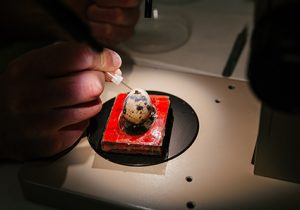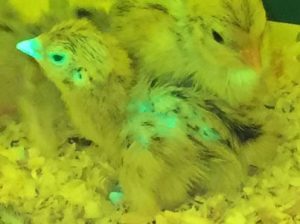
The chicken embryo has been a popular animal model in basic research in particularly developmental biology research.
Completed in 2017, the Monash Transgenic Quail Facility (MTQF) is unique and ground-breaking as it breeds transgenic Japanese quail lines, which play an important role in a plethora of scientific research fields.
The research world has been slow to adopt the quail as a transgenic animal model, due to the outdated method of genetic manipulation available. In collaboration with scientists from the CSIRO, we have been able to establish more effective ways to modify the genes expression in the quail model. Using a transposon genome integration system (Tol2), we have produced since 2016 seven transgenic lines for the scientific community. We are now experimenting with using the revolutionary CRISPR/Cas9 system for genome editing.
There are many advantages to the Japanese quail model. Their genome has been sequenced and is publicly available. They are an efficient model, taking 6-7 weeks to become sexually mature allowing six generations per year for fast track genetic studies. Like Chicken, they lay about one eggs per day, which can be stored at 15 degrees for a week. Their smaller size than chicken allowed to house more birds in limited space. The MTQF is an approved Physical Containment level 2 (PC2) and QAP5.1 quarantine certified facility.

We are in the process of some pioneering work, optimising breeding, genetic modification and embryo imaging techniques. Notably, we have transformed the process of genotyping, with a Green Fluorescent Protein-tagged construct that is expressed in the lens of the eye only when the process of transgene integration has been successful.
Quails are not only a powerful animal model for use in the academic research. Sharing 95% of its genome with the chicken, the poultry industry can also benefit from using the quail. Genetically modified quail could be beneficial to the poultry industry by performing large gene modification screen to improve disease resistance or wellbeing in quail before selecting specific target genes to be tested in other poultry animals.
At MTQF, we can produce genetically modified quails for both research academic and industry. Eggs can be shipped nationally and globally.
For more information, contact Dr. Olivier Serralbo (olivier.serralbo@monash.edu)
Web: https://www.monash.edu/research/infrastructure/platforms-pages/transgenic-quail


